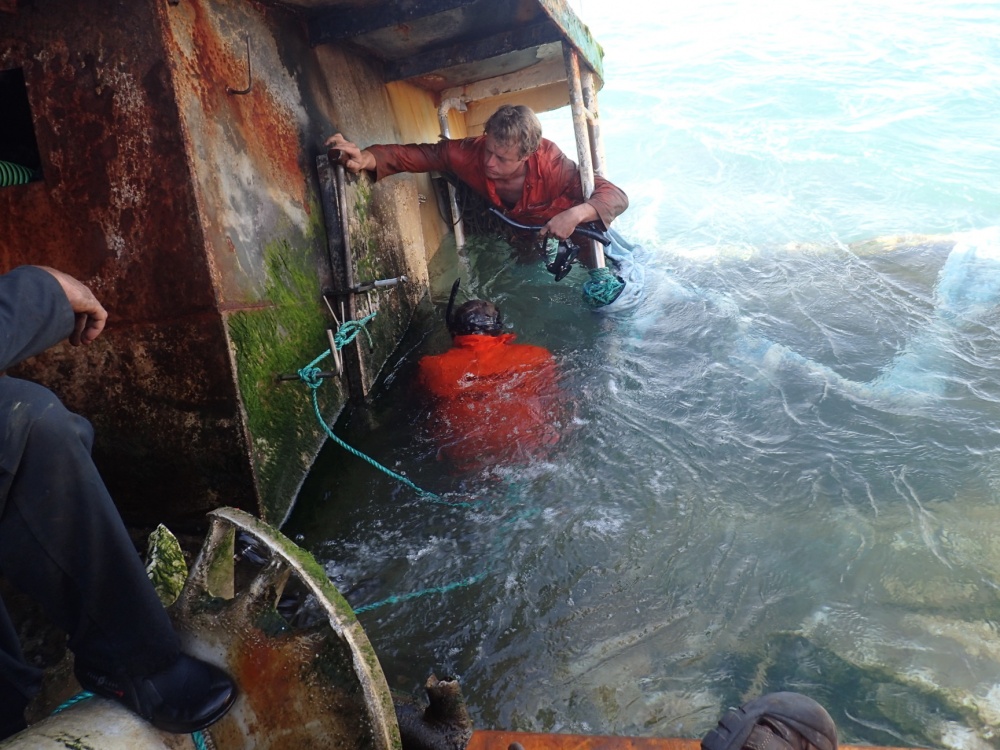
The pursuit of tuna can be profitable for holders of permits allowing them to catch prized bigeye in waters around Hawai‘i. Here are a few of the benefits those permits confer to those who hold them:
- They can pay their foreign workers pennies an hour. A recent report found that these undocumented workers, such as those that were aboard the Pacific Paradise when it ran aground, earn on average $500 per year;
- They are allowed to avoid substantial penalties by pleading poverty. That’s what the owners of the Pacific Paradise and Pacific Dragon did when the state tried to seek compensation for damage to the reef and also when the federal government sued them for violating the Clean Water Act;
- The messes they make are cleaned up at the public’s expense. Again, to cite just the case highlighted in this issue, owners of the Pacific Paradise have argued in court that federal law limits their exposure should they eventually be found to be at fault.
- They are able to sell their fish at premium prices. According to one report, in May 2018, the average revenue just for ahi sales to each of the 114 boats that unloaded their catch that month was nearly $57,000. Over and above that were sales of non-target fish, such as mahimahi, ono, opah, and other species.
To support this enterprise, taxpayers spend millions of dollars a year in managing the Hawai‘i-based longline fishery. This includes federal appropriations for the National Marine Fisheries Service’s Pacific Islands Regional Office and its Pacific Islands Fisheries Science Center. The salary and benefits conferred on Kitty Simonds, executive director of the Western Pacific Fishery Management Council, as well as pay and benefits for her staff, fall into this category as well. There’s the uncounted but substantial draw-down on the public purse when the Coast Guard responds to the distress calls of these vessels, which, as any stroll past the Honolulu harbor will reveal, can often be poorly maintained and barely seaworthy. Yes, they are required to carry observers at times – but they are reimbursed for that as well, again by taxpayers.
And the cost of these privileges to the permit holder?
The princely sum of $34 a year, if the permit is renewed online. Otherwise, it’s a whopping $57.
Nor does there seem to be any penalty for permit holders whose actions come under repeated scrutiny. The owners of the Pacific Paradise, for example, were known to the Coast Guard to have a history of engaging in practices that led to oil pollution long before the events aboard another of their vessels, the Pacific Dragon, led to a Clean Water Act lawsuit. Yet the Pacific Dragon is still plying the seas, under a “new” owner – same people, just a different name.
No Indemnity
If you own a car, you must carry insurance. It’s the state’s way of making sure that if you damage people or property while driving, those who are injured aren’t forced to pay the costs of being made whole.
But if you own a commercial longline fishing vessel, there’s no similar requirement. The state Department of Transportation does require vessel owners who tie up at its piers to indemnify the department and its employees “against all losses, claims, demands, and suits for damages … incident or resulting from their operations” at DOT facilities – and only at DOT facilities.
(That hasn’t always worked out well, as attests the DOT’s 10-month-long effort in 2015 to remove a sinking, derelict, fishing vessel, the Judy K, from Pier 16 in Honolulu Harbor.)
The National Marine Fisheries Service, which grants fishing permits to the longliners, does not require them to carry any insurance, nor does the Coast Guard.
Moving Forward
To protect the state’s reefs, it is vitally important that it have the ability to recover damages caused by groundings and other human-caused activities. The state’s law requiring vessels moored at Department of Transportation facilities to have insurance adequate for damages only at those facilities should be changed to require that the state be indemnified against damages throughout state waters.
Bryan Ho, attorney for the Pacific Paradise owners, argued that by statute, the Department of Land and Natural Resources was limited to collecting fines for damage to corals and live rock and is barred from seeking recovery of the value of the resources themselves. While the Supreme Court’s decision in the Pfleuger case would seem to argue against this position, it might not be a bad idea for the Legislature to consider amendments to statutory language that make it crystal clear that people or companies that destroy natural resources valued for their utility, their economic benefit, or their sheer beauty, will be held liable for the full loss.
Finally, the ability to hold anyone liable for damages requires that the state or federal government be able to identify the responsible party. Yet several of the 140- plus holders of federal longline permits are companies that have been dissolved or otherwise have no traceable registered agent. The Pacific Islands Regional Office of NMFS has a lot on its plate, to be sure, but it is a straightforward matter to double-check information provided by permittees against records maintained by the state and the Western and Central Pacific Fisheries Commission. Discrepancies need to be resolved immediately.

Leave a Reply